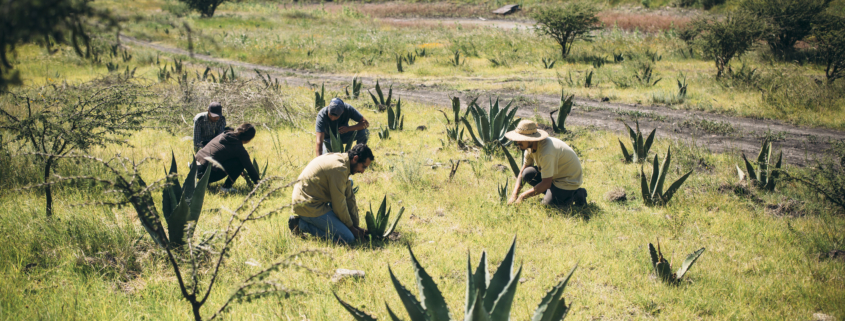Billion Agave Project Initiative is Presented at the CICY
MÉRIDA, YUCATÁN, NOVEMBER 24, 2023 – On November 23rd, the “Billion Agave Project Initiative, between Regeneration International and CICY” was presented at the Scientific Research Center of Yucatán (CICY), in the framework of which a collaboration agreement was signed between these two entities, whose purpose is to develop the science and technology that will allow the implementation of the Billion Agave Project (BAP) in Yucatán.
The BAP, with a focus on economic, social and environmental sustainability and in collaboration with the social, academic, private and public sectors, aims to contribute to the preservation of the environment and the holistic improvement of people’s living conditions, through the creation and implementation of various wide-ranging productive projects that take full advantage of and add value to Yucatán’s flagship crop: henequén.
The event was attended by Dr. Pedro Iván González Chi, the general director of CICY; Ercilia Sahores, the LATAM director of Regeneration International (RI); M.C. Javier García Villalobos, the director of Technology Management of CICY and project liaison; Arturo Carrillo, the national coordinator of the Billion Agave Project (BAP); Sotuta de Peón William Lübke, the owner and general manager of Hacienda Sotuta; and Ing. Ignacio Alberto Vadillos Coral, Director of Planning, Financing and Sector Coordination, who attended on behalf of MVZ; and Jorge Díaz, head of the Secretariat of Rural Development (SEDER) of the Yucatán State Government.
In the presentation, Dr. Pedro Iván González said that CICY, since it was formed, has focused on the study of agaves, not limited to henequen, but also has experience in agaves for the mezcal and tequila industries, with specialists that from science and technology provide solutions along the value chain that is formed for the different crops. He expressed the willingness of the institution he represents to articulate actions with the different actors, from the small producer to our leaders in the State Government, to guarantee the success of the project.
Likewise, Ercilia Sahores commented that Regeneration International emerged in June 2015, at a meeting in Costa Rica with representatives of businesses, farming and scientific communities, educational institutions, policy makers and NGOs from 21 countries, to develop a blueprint for an international movement united around a common mission: To build a global network of farmers, scientists, activists, entrepreneurs, educators, journalists, consumers and public policy shapers that will promote and implement regenerative agriculture and land use practices that provide abundant and nutritious food; revitalize local economies; regenerate soil fertility and its capacity to retain water; nurture biodiversity; and restore climate stability by reducing greenhouse gas emissions from agriculture, while capturing excess carbon from the atmosphere and depositing it in the soil.
Arturo Carrillo explained that the BAP consists of implementing various productive agave based projects that recover the vision of integral use that the native communities have had since time immemorial, and that generate sustainable economic, environmental and social solutions in the regions where they are implemented. He added that the strategy is to develop these projects, initially, in three implementation hubs: at the Vía Orgánica Research Farm in San Miguel de Allende, Gto, at the Centro de Desarrollo Integral Campesino de la Mixteca (CEDICAM) in Nochixtlán, Oaxaca, and at the Sotuta de Peón Hacienda, in Yucatán. Some of these productive projects include the extraction and commercialization of inulin and lactic acid, the formulation of feed for productive and affective animals, the production of fermented and distilled products, and the production of molasses and syrup, among others, and all of them are being developed based on scientific and technological research of the highest level, in collaboration with institutions such as the CICY.
He concluded by saying that this type of projects can only be developed in collaboration with the social, academic, private and public sectors, which is why -he remarked- an indispensable component in which we are working hard, is the linkage with these sectors.
In his speech, William Lübke commented that the project represents a great opportunity, giving continuity to the tests currently being carried out with plants produced by CICY, to identify an integral use of the henequen crop. He added that a project that comes with more information on what can be done with the plant is wonderful and encouraging for the peninsula itself and for the producers.
Mr. Vadillos, an engineer from SEDER, pointed out that the BAP project has great potential, as it coincides with other initiatives, such as the implementation of silvopastoral systems, indicating that there is an opportunity for collaboration to promote the resurgence of Yucatan’s green gold. He emphasized the importance of the projects having the support of research and always focusing them on environmental care.
He added that it is very gratifying to know about projects such as the BAP that integrate the participation of the research area and the private sector, a combination to which he predicts great success, and emphasized that the governmental sector will always be present to support this type of projects as much as possible.
To end the event, Mr. M.C. García Villalobos, Director of Technology Management at CICY, emphasized that this project is a clear example of articulation of the Pentahelix, which is the basis of the Mexican innovation model, and invited the academic community of the Conahcyt Research Center to contribute proposals for the BAP project from CICY’s areas of expertise, which participates as a member of the alliance, to provide solutions derived from scientific and technological research and to propose alternative strategies for henequen cultivation, as a supplier of the plants that would be used, which have been produced by CICY in its “Dr. Manuel L. Robert” Biofactory, as well as in its “Dr. Manuel L. Robert” Biofactory, as a supplier of the plants that would be used, which have been produced by CICY in its “Dr. Manuel L. Robert” Biofactory. Manuel L. Robert” Biofactory, as well as options for its integral use (JCDO-Divulgación CICY).

